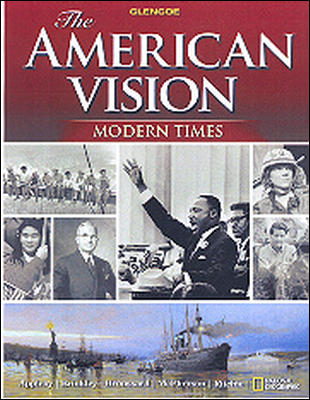The American Vision: Modern Times © 2008Chapter 3:
The Civil War and ReconstructionWeb Lesson PlansIntroduction
Students have read about the battles of the Civil War. In this activity students
will analyze the impact of the war by reading actual letters of Union and Confederate
soldiers.
Lesson Description
Students will use information from the Images of Battle Web site to read first-hand
accounts of the Civil War and its impact. Students will read actual letters
of Union and Confederate soldiers that give details of battles, of interactions
within the cities, of caring for the wounded and dead, and of their reasons
for fighting the war. Students will then answer four questions and apply this
information by writing a poem that a soldier might have written after hearing
that the war was over.
Instructional Objectives- Students will demonstrate an understanding of the experiences on the Civil
War battlefields.
- Students will be able to use this knowledge to write a poem that a Civil
War soldier might have written after hearing that the war was over.
Student Web Activity Answers- In the First Battle of Bull Run, the Confederate troops were outnumbered
more than 2 to 1, yet they defeated the Union troops. The soldier related that the hills on which they fought hid the fact that
there were so few Confederate soldiers. He stated that if the Northern troops
had perceived their advantage, they would have advanced more confidently and forcefully.
- One soldier described a hospital as "crowded with groaning men, some
undergoing the agonies of amputation." Buildings were converted into
hospitals—houses and a university hall are mentioned. One writer reported
that whiskey soothed the pain of a gunshot wound. Several letters mentioned
that the circumstances of war sometimes forced soldiers to abandon their fallen
comrades. The letters described fields thick with corpses.
- When Union soldiers marched down the streets of Frederick, Maryland, citizens
rushed to their windows to wave and cheer for the Yankee soldiers. The Rebels,
anxious to prove the South's might, seized the opportunity to attack the Yankees
right before the spectators. One soldier told a story about how Yankees in
Fredericksburg, Virginia, pillaged every building, including the churches.
- A Confederate soldier relayed his anger at the North's treatment of his
mother. He referred to the North's "wicked undertaking." The letters
indicate that the Southern soldiers felt that they were defending their rights
and that they resented Northern oppression. The Northern soldiers made references
to freeing enslaved people. Both mentioned their devotion to God.
- Students' poems will vary.
 | 




